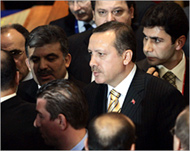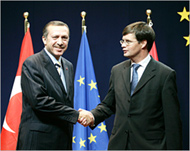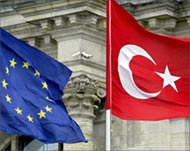EU, Turkey strike deal on entry talks
The European Union and Turkey have reached a historic agreement on starting talks to admit Ankara into the bloc after overcoming last-minute haggling over its relationship with EU member Cyprus.

The 25 EU leaders on Friday agreed to open accession negotiations with Turkey on 3 October 2005, but said talks would be open-ended with no guaranteed outcome in a nod to deeply sceptical public opinion in much of western Europe.
The landmark deal, which could change the face of Europe and Turkey in the coming decades, came after hours of wrangling between Turkish Prime Minister Reccep Tayyip Erdogan and Dutch Prime Minister Jan Peter Balkenende, the summit chairman, mainly over Cyprus.
“(It) is a historic event,” British Prime Minister Tony Blair said. “It shows that those who believe there is some fundamental clash in civilisations between Christian and Muslim are actually wrong, that we can work together and we can cooperate together.”
Turkey pledge
Turkey pledged unilaterally to sign a protocol extending its EU association agreement to 10 states which joined the bloc in May, including Cyprus, before it starts entry talks.
In return, Balkenende, holder of the EU presidency, would spell out that this was not tantamount to recognition of the Greek Cypriot government in Nicosia, which Ankara has rejected until there is a settlement for the divided island.
 |
|
At one point, Erdogan threatened |
Diplomats said the EU dropped a humiliating demand that Turkey initial the pact immediately on Friday.
At one point, Erdogan threat-ened to walk out after Cyprus demanded a written commit-ment. He was dissuaded by Balkenende, Blair and German Chancellor Gerhard Schroeder, the diplomats said.
EU leaders kept summit guest UN Secretary-General Kofi Annan waiting for more than an hour as they negotiated over Cyprus.
A Turkish official quoted Erdogan as telling Balkenende at one point: “You are choosing 600,000 Greeks (Cypriots) over 70 million Turks, and I cannot explain this to my people.”
Political significance
British Foreign Secretary Jack Straw played down the political significance of signing the so-called Ankara protocol, saying: “It does not involve formal or informal recognition of the government of Cyprus and we have been trying to reassure the Turkish government about that.”
A British diplomat noted many countries had legally binding agreements with entities such as the Palestinian Authority or Taiwan without recognising them as states.
 |
|
Balkenende (R) will spell out the |
Turkey‘s accession process is certain to be long, with membership at least a decade away.
It will force Turkey to transform its economy, society and long authoritarian politics, and require the EU to revise fundamentally its two main spending policies – farm subsidies and regional aid, which the poor nation would expect to draw on.
The EU decision made clear Turkey could not join before 2015, by which time it is projected to have the bloc’s largest population with more than 80 million, giving it the most voting power in decision-making and the most European Parliament seats.
Supporters’ view
Turkey‘s supporters say bringing in the vast, mainly agrarian country on the cusp of Europe and the Middle East, viewed by Washington and others as a key Western ally, would spread stability and security, and promote dialogue with the Islamic world by taking in a vibrant Muslim democracy.
 |
|
Turkey’s accession supporters |
Opponents say it is too big, too populous, too poor and too culturally different to integrate into the EU, and the bloc risks a mass influx of Turkish workers and “enlarging itself to death” by extending its borders to Iran, Iraq and Syria.
The summit statement said the shared aim of the talks would be accession, but it would be “an open-ended process, the outcome of which cannot be guaranteed beforehand”.
If an applicant was unable to meet all criteria for membership, “it must ensure that the candidate state concerned is fully anchored into the European structures through the strongest possible bond”, the leaders said.
Alternative
That was as near as sceptical conservative governments in France, Austria and Denmark came to winning a hint of some alternative to full membership.
|
“It shows that those Tony Blair, |
The deal, toasted by EU leaders with champagne, comes more than 40 years after Ankara signed an association deal as a first step to membership in 1963.
There was uncertainty until the final moment about whether the decision would contain conditions not applied to past candidates in a nod to popular concerns about the cost of integrating Turkey and fears of a wave of poor immigrants.
Erdogan lobbied hard against conditions Turkey considered discriminatory such as a possible permanent emergency brake on labour migration.
However, the final document did mention the possibility of derogations from the EU treaty or permanent safeguard clauses, spelling out that this was not the same as permanent restrictions on freedom of movement.